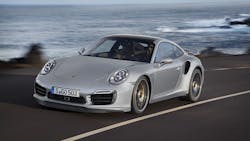Automotive Supply Chain: Overcoming Ethnic Rifts
GORAZDE - Muslim and Serb workers at the Bekto Precisa factory are focused only on how to improve products for clients like Porsche (IW 1000/724), Ferrari and Lamborghini.
Despite deep interethnic divisions that have endure almost 20 years after the 1992-1995 Bosnian war, the two communities at the unit in the eastern town of Gorazde work together in harmony.
"Economy does not recognize borders. Our company does not care about the confession or nationality of the employees. Here, a man is valued for what he does," said Amir Coralic, a company manager.
Set up in 2005 by businessman Redzo Bekto, the factory on the right bank of the Drina River has been growing despite an economic crisis.
It employs 540 people, including 45 engineers, and the management hopes to increase the workforce to 1,000 in the next six years.
This is the exception in a country of 3.8 million where the official jobless rate stands at 44%.
The Bekto Precisa factory manufactures sensor parts and other equipment for the car industry as well as components for sport skis, Mensur Brdar of the company said.
"We export more than 95% of the production to western Europe, the United States and Mexico," he said, giving no precise figures.
The company is proud of its client list, which also includes top-range carmakers such as BMW (IW 1000/31), Audi (IW 1000/59), Volkswagen (IW 1000/6) and Mercedes.
Focus on Skills
"Porsche has never produced a single component for its vehicles outside of Germany. However, today, parts for their cars are being made in Germany and Gorazde," Brdar said.
Natasa Danojlic, a 37-year old lawyer, has been working for the company for a year-and-a-half. She is a Serb and lives in Visegrad, some 24 miles east of Gorazde.
"This is a really European company that evaluates you by your skills and not by ethnic origin," she said.
And this is not an isolated case.
Derventa, a small northern town in Bosnia's Serb-run entity, is home to several factories, about half of them set up by Austrian, German or Italian companies, employing about 7,000 people.
Mreza Network, founded in 2005 has 350 people on its rolls.
It manufactures electric cables for engines, notably for the Liebherr group whose products range from domestic appliances to mining equipment, and Ferrari, Lamborghini and Formula 3 cars, its manager Zoran Tosic said.
The employees are drawn from Bosnia's three main ethnic communities -- Serbs, Croats and Muslims -- and work together without a problem, he said.
"The economy is a basis for any development. If we did not give a priority to the economy, we would never emerge from these inter-ethnic divisions," Tosic said.
Rusmir Smajilhodzic, AFP
Copyright Agence France-Presse, 2014
About the Author
Agence France-Presse
Copyright Agence France-Presse, 2002-2025. AFP text, photos, graphics and logos shall not be reproduced, published, broadcast, rewritten for broadcast or publication or redistributed directly or indirectly in any medium. AFP shall not be held liable for any delays, inaccuracies, errors or omissions in any AFP content, or for any actions taken in consequence.
